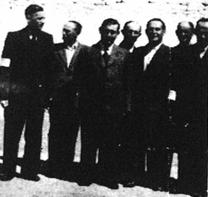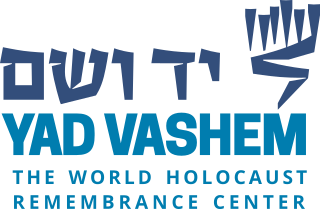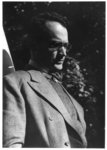Related Research Articles

A Judenrat was a World War II administrative agency imposed by Nazi Germany on Jewish communities across occupied Europe, principally within the Nazi ghettos. The Germans required Jews to form a Judenrat in every community across the occupied territories.

Yad Vashem is Israel's official memorial to the victims of the Holocaust. It is dedicated to preserving the memory of the Jews who were murdered; honoring Jews who fought against their Nazi oppressors and Gentiles who selflessly aided Jews in need; and researching the phenomenon of the Holocaust in particular and genocide in general, with the aim of avoiding such events in the future.

Jan Karski was a Polish soldier, resistance-fighter, and diplomat during World War II. He is known for having acted as a courier in 1940–1943 to the Polish government-in-exile and to Poland's Western Allies about the situation in German-occupied Poland. He reported about the state of Poland, its many competing resistance factions, and also about Germany's destruction of the Warsaw Ghetto and its operation of extermination camps on Polish soil that were murdering Jews, Poles, and others.

Varian Mackey Fry was an American journalist. Fry ran a rescue network in Vichy France that helped approximately 2,000 to 4,000 anti-Nazi and Jewish refugees to escape Nazi Germany and the Holocaust. He was the first of five Americans to be recognized as "Righteous Among the Nations", an honorific given by the State of Israel to non-Jews who risked their lives to save Jews during the Holocaust.

The United States Holocaust Memorial Museum (USHMM) is the United States' official memorial to the Holocaust. Adjacent to the National Mall in Washington, D.C., the USHMM provides for the documentation, study, and interpretation of Holocaust history. It is dedicated to helping leaders and citizens of the world confront hatred, prevent genocide, promote human dignity, and strengthen democracy.

During World War II, some individuals and groups helped Jews and others escape the Holocaust conducted by Nazi Germany. Since 1953, Israel's Holocaust memorial, Yad Vashem, has recognized 26,973 persons as Righteous among the Nations. Yad Vashem's Holocaust Martyrs' and Heroes' Remembrance Authority, headed by an Israeli Supreme Court justice, recognizes rescuers of Jews as Righteous among the Nations to honor non-Jews who risked their lives during the Holocaust to save Jews from extermination by the Nazi Germany.

Righteous Among the Nations is an honorific used by the State of Israel to describe non-Jews who risked their lives during the Holocaust to save Jews from extermination by the Nazis for altruistic reasons. The term originates with the concept of "righteous gentiles", a term used in rabbinic Judaism to refer to non-Jews, called ger toshav, who abide by the Seven Laws of Noah.

The Memorial to the Murdered Jews of Europe, also known as the Holocaust Memorial, is a memorial in Berlin to the Jewish victims of the Holocaust, designed by architect Peter Eisenman and Buro Happold. It consists of a 19,000-square-metre (200,000 sq ft) site covered with 2,711 concrete slabs or "stelae", arranged in a grid pattern on a sloping field. The original plan was to place nearly 4,000 slabs, but after the recalculation, the number of slabs that could legally fit into the designated areas was 2,711. The stelae are 2.38 m long, 0.95 m wide and vary in height from 0.2 to 4.7 metres. They are organized in rows, 54 of them going north–south, and 87 heading east–west at right angles but set slightly askew. An attached underground "Place of Information" holds the names of approximately 3 million Jewish Holocaust victims, obtained from the Israeli museum Yad Vashem.

Yehuda Bauer is an Israeli historian and scholar of the Holocaust. He is a professor of Holocaust Studies at the Avraham Harman Institute of Contemporary Jewry at the Hebrew University of Jerusalem.

Gedenkdienst is the concept of facing and taking responsibility for the darkest chapters of one's own country's history while ideally being financially supported by one's own country's government to do so. Founded in Austria in 1992 by Andreas Maislinger the Gedenkdienst is an alternative to Austria's compulsory national military service as well as a volunteering platform for Austrians to work in Holocaust- and Jewish culture-related institutions around the world with governmental financial support. In Austria it is also referred to as Austrian Holocaust Memorial Service provided by the Austrian Service Abroad. The Austrian Gedenkdienst serves the remembrance of the crimes of Nazism, commemorates its victims and supports Jewish cultural future. The program is rooted in the acknoledgment of responsibility by the Austrian government for the crimes committed by National Socialism.

Albrecht Becker was a German production designer, photographer, and actor who was imprisoned by the Nazi regime for the charge of homosexuality.

The Holocaust had a deep effect on society both in Europe and the rest of the world, and today its consequences are still being felt, both by children and adults whose ancestors were victims of this genocide.

Anti-Jewish legislation in pre-war Nazi Germany comprised several laws that segregated the Jews from German society and restricted Jewish people's political, legal and civil rights. Major legislative initiatives included a series of restrictive laws passed in 1933, the Nuremberg Laws of 1935, and a final wave of legislation preceding Germany's entry into World War II.

The Holocaust in Ukraine took place in the Reichskommissariat Ukraine, the General Government, the Crimean General Government and some areas which were located to the East of Reichskommissariat Ukraine, in the Transnistria Governorate and Northern Bukovina and Carpathian Ruthenia during World War II. The listed areas are currently parts of Ukraine. Between 1941 and 1944, more than a million Jews living in the Soviet Union, almost all from Ukraine and Belarus, were murdered by Nazi Germany's "Final Solution" extermination policies and with the help of local Ukrainian collaborators. Most of them were killed in Ukraine because most pre-WWII Soviet Jews lived in the Pale of Settlement, of which Ukraine was the largest part. The major massacres against Jews mainly occurred during the first phase of the occupation, although they continued until the return of the Red Army of the Soviet Union.

POLIN Museum of the History of Polish Jews is a museum on the site of the former Warsaw Ghetto. The Hebrew word Polin in the museum's English name means either "Poland" or "rest here" and relates to a legend about the arrival of the first Jews to Poland.

Antony Barry Polonsky is Emeritus Professor of Holocaust Studies at Brandeis University. He is the author of many historical works on the Holocaust, and is an expert on Polish Jewish history.

Sigmund A. Rolat or Zygmunt Rolat is a philanthropist, art collector and businessman. He is a founding donor of Polin, The Museum of the History of Polish Jews and a key supporter of numerous charitable endeavors.

Arthur S. Obermayer was an American chemist, entrepreneur and philanthropist. He was the founder and president of the Moleculon Research Corporation. He was a co-founder of Partners for Progressive Israel and the Obermayer German Jewish History Awards.
Zvi Hirsch Koretz, also written as Tzevi or SeviKoretz, was an Ashkenazi Jew who served as the Chief Rabbi of Saloniki's Jewish community from 1933 to 1945. His role as president of the Judenrat during World War II has been called into controversy, with many accusing him of being a Nazi collaborator.
References
- ↑ Loval, Werner (2014). We Were Europeans. Jerusalem, Israel: Gefen Publishing House. p. 485. ISBN 9789652297471.
- ↑ Butler, Desmond (January 28, 2002). "American Honors Germans Who Preserve Jews' History". The New York Times.
- ↑ "History Buffs Honored". Washington Jewish Week. January 30, 2003.
- ↑ "Germans recognized for work remembering Jews". Associated Press. January 26, 2004.
- ↑ "Five Germans being recognized for work remembering Jews' history, culture". MacLean's. January 26, 2005.
- ↑ "Six honored for preserving Jewish history and culture". Boston Globe. January 25, 2006.
- ↑ Ward, Josh (January 25, 2007). "5 Germans honored for helping to preserve Jewish history and culture". Associated Press.
- ↑ "Germans honored for preserving Jewish past". MSNBC. January 23, 2008.
- ↑ Fleshler, Dan (Winter 2009). "The Jews Who Lived Among Us". Reform Judaism.
- ↑ Stevens, Laura (January 25, 2010). "Cemetery project among Jewish award winners". Washington Post.
- ↑ Fein, Leonard (February 4, 2011). "Hello, Germany". The Forward.
- ↑ Fleshler, Dan (March 7, 2012). "Too Much Holocaust Education?". The Huffington Post.
- ↑ Black, Lisa (January 25, 2014). "Quest salvages life from death". Chicago Tribune.
- ↑ Fryer, Bob (February 27, 2015). "German teacher connects family history for Pinellas man" (PDF). Jewish Press of Tampa.
- 1 2 3 4 5 6 7 "Profiles". Widen the Circle. Retrieved 2022-10-02.